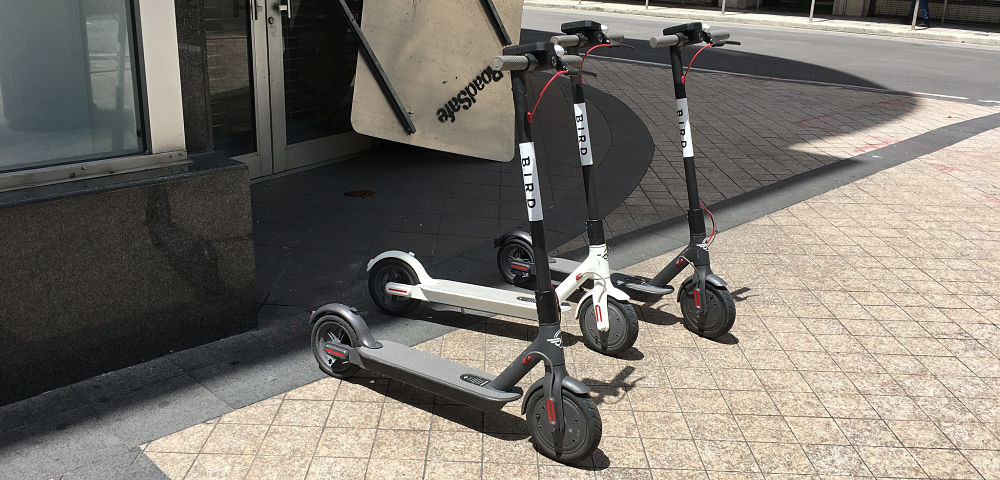Santa Monica Bans Bird Scooters In Favor of Uber and Lyft Offerings

Santa Monica may become the latest city to ban Bird Scooters. Bird was forced to send an email on Monday, announcing that “All Birds will be unrideable starting today and will return depending on the outcome of the City Hall meeting on Tuesday at 5:00 p.m.” The City has already voted to ban the scooters in favor of competitors in an upcoming pilot test. A rally is planned for Tuesday evening so Bird supporters can march in support of their beloved scooters.
First to Market
The Bird Scooter Company was widely seen as being “first to market”. It won applause for its innovative approach. Many environmentalists cheered the energy efficiency of Bird’s transportation solution. Despite all these advantages, Bird has become a target of city officials and residents of Santa Monica.
Bird was the first company to implement dockless, shared electric scooters. It began scattering its scooters around Santa Monica late in 2017. One day the scooters appeared, seemingly out of nowhere. Scooters were parked at intersections, in front of Starbucks, and at train stations. No signs were there to explain the scooters to passersby. Curious Santa Monica residents went to the web and were able to figure out that they needed to download the Bird app, register and pay $1 to unlock the scooter for a ride and 15 cents a minute after that. Some residents and tourists loved the Scooters and immediately started to use them.
What Went Wrong?
The Scooters came without any sort of safety instructions. Users just jumped right on without understanding where they could legally ride them. Most did not wear helmets. Soon, accidents were being reported in the press.
Being first to market meant that Bird didn’t apply for any permits and did not meet with Santa Monica city officials prior to launch. This is strange since Bird is headquartered in Santa Monica, where CEO Travis VanderZanden tested the concept and launched the service in 2017. He had an easy opportunity to cultivate a relationship with community leaders and government officials, but he failed to do so until late in the game.
Santa Monica Mayor Ted Winterer was first introduced to the Company when VanderZanden sent him a message on LinkedIn, after Bird scooters were lining the streets in Santa Monica. Since that time, Bird has incurred and paid over $300,000 in Santa Monica City Fines.
It has repeated this pattern in other cities, launching without first getting the proper approvals, creating tension with many city governments. Bird has already been banned in a number of cities, including by San Francisco, Denver, West Hollywood, Beverly Hills, and El Segundo.
Uber and Lyft Takeover the Market
Bird never gained the support of Santa Monica city officials. The City of Santa Monica is starting to embrace scooters, and introduced a pilot program that will allow certain scooter companies to operate in Santa Monica. Bird is not one of the companies selected to participate in the Pilot. As of the writing of this article, it appears that Santa Monica will exclude Bird and instead allow two other scooter companies (one affiliated with Lyft and the other affiliated with Uber) to operate in Santa Monica.
Bird’s defeat allows Uber and Lyft the chance to dominate the scooter market in Santa Monica. They’re already the two biggest players in the motor vehicle ride share space. They have relationships with city officials across the globe. They have the funding to gain significant market share. Their valuations are likely to increase after Santa Monica’s announcement. Uber and Lyft appear ready to cross market scooters to their existing ride share customers.They may urge users to pick up a scooter and ride to a less crowded area a few blocks away in order to jump into an Uber vehicle. Both companies already have broad and deep logistical networks in place.
Could Any Company Have Gained Support in Santa Monica?
Perhaps no one would have succeeded by being the first to bring shared scooters to Santa Monica. Even if Bird played by all the rules and applied for permission before entering the market, they might have failed to ever get approval. Santa Monica is not known for being particularly pro-business and is not known for being quick to make decisions.
Many of the things that made Bird unpopular with citizens of Santa Monica were beyond the control of Bird management. Bird requires that all users be 18 or older, but large numbers of tweens and younger teens used the drivers licenses of friends and family members to register. Bird rules officially directed users to wear a helmet, but almost all Bird users ignored that direction. News stories about terrified pedestrians, frustrated bike riders, infuriated drivers, and Bird users badly injured in crashes appear to have had an impact, turning an initially curious and supportive Santa Monica citizenry against Bird.
The final chapter has not yet been written for Bird. Plenty of companies have recovered from setbacks worse than the one Bird just suffered in Santa Monica. But Uber and Lyft are fearsome competitors with very deep pockets. Bird is in for a very tough fight.
Image via @bird.
Postscript: Bird and Lime were accepted into Santa Monica’s program after protests.



